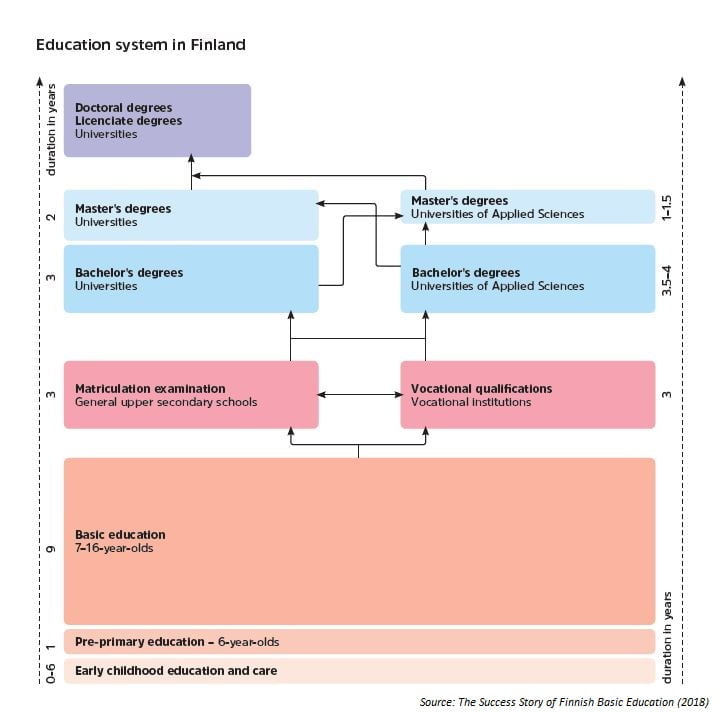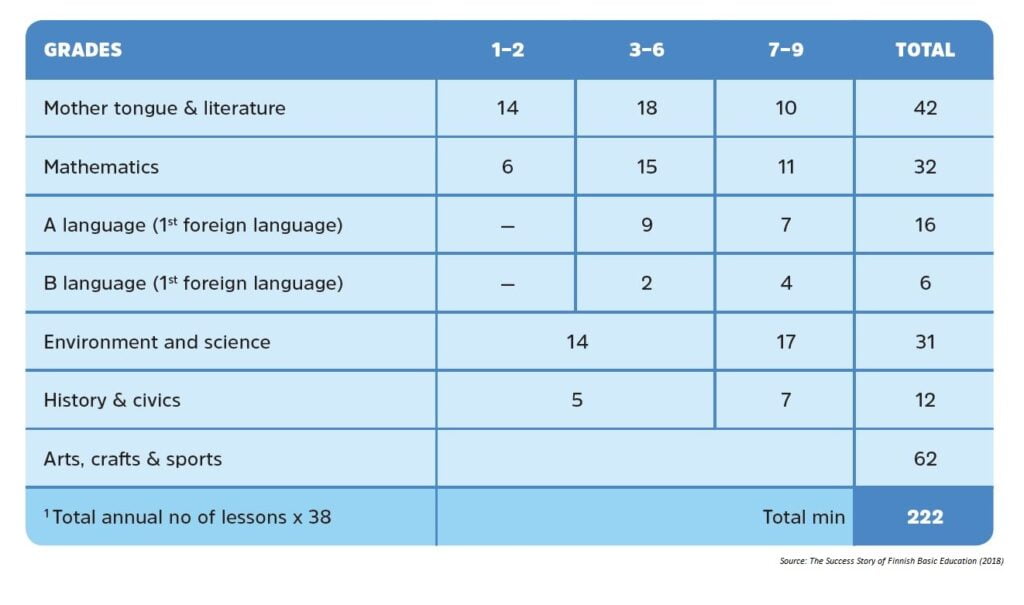One of the biggest success factors behind the Finnish education system is trust in the teachers’ professional skills. Teachers are regarded as independent specialists, who best know the individual strengths and needs of their pupils. The national core curriculum determines the objectives and core contents of different subjects and gives guidelines e.g. for pupil assessment, the planning of learning environments and suggested working approaches, but teachers are highly autonomous to choose their own teaching methods and even materials that best suit their pupils’ needs. Teachers are encouraged to try out new ideas and approaches and to make the school an inspiring place to learn.
Behind the success of Finnish education is also the fact that teachers in Finland are highly qualified. A Master’s degree is a requirement for all teachers in basic education, both for class teachers, subject teachers, special needs teachers and guidance counsellors. Class teachers usually teach classes from 1–6, and subject teachers, who only teach one or a few particular subjects, step in for grades 7–9. Since the qualifications for teachers are uniform all over Finland, the standard and level of teaching varies very little between schools. Children in the rural areas receive the same high quality teaching as children in big cities.
In Finland, the teaching profession is highly valued in the society. Teachers themselves feel satisfied with their job and are happy in their profession. According to a recent OECD study, only a few countries in the world have managed to attract the best students to pursue a teaching career. In Finland, class teacher education is among the most popular programmes in universities, and universities are able to choose the best candidates. One reason for this is the fact that teachers in Finland enjoy a high level of freedom and trust in their profession. The same OECD study found that in the top PISA countries, competent teachers can be found in every school. Finland is a perfect example of this, since all teachers receive the same high-quality, research-based training.
To become a teacher – teacher training
One of the reasons for the high professional competence among Finnish teachers is the fact that teacher training institutions can select heavily. In year 2016, for instance, only 12 % of those who applied were accepted into class teacher education. Teachers in Finland are trained in universities. Teacher education is carried out by the faculties of education in co-operation with the faculties of different teaching subjects.
Class teacher education in Finland (Master’s degree, 300 ECTS) consists of basic, intermediate and advanced studies in education, multidisciplinary studies of school subjects, teacher’s pedagogical studies and minor subject studies. Teachers’ pedagogical studies amount to 60 ETCS, and include both theoretical studies and practical training (20 ECTS minimum).
All class teachers also complete a Master’s thesis (40 ECTS). Thus, Finnish teachers are also trained in research skills, which enables them to monitor and develop their own work according to research findings.
All teacher students participate in teaching practice, which guarantees that Finnish teachers have had experience with real pupils before they enter the profession. Teaching practice includes observation of more experienced teachers, giving supervised lessons alone or with other trainees, and subject-didactic group counselling with discussions and assessment meetings between student teachers and instructors. In Finland, the teacher training schools offer facilities for guided training where theory and practice are intertwined. Collaboration between teacher training schools and faculties of education helps teacher students to apply the theoretical knowledge from their studies into practice.
In many ways, teacher training schools are just like any other schools in Finland. Pupils are the children, who live in the nearby area, just like in any other municipal school. The curriculum followed by these schools is also the same core curriculum as anywhere else in Finland. However, teacher training schools are not owned by municipalities, but are part of universities. Teacher training schools include primary education (grades 1–6), secondary education (grades 7–9) or general upper secondary school (grades 10–12), or all of these.
University level class teacher education gives Finnish teachers a good basis for professional life. In their work, teachers are encouraged to use their creativity. They are not expected to mechanically follow the same procedures, but to use their skills to modify their working methods when meeting different pupils. Finnish teachers are also eager to develop their professional competence by participating in in-service training. Some Finnish municipalities organise in-service training uniformly for all teachers, and in others, individual teachers can decide what type of training to participate in. Municipalities are required to fund three days of professional development (or planning) annually for each teacher.






